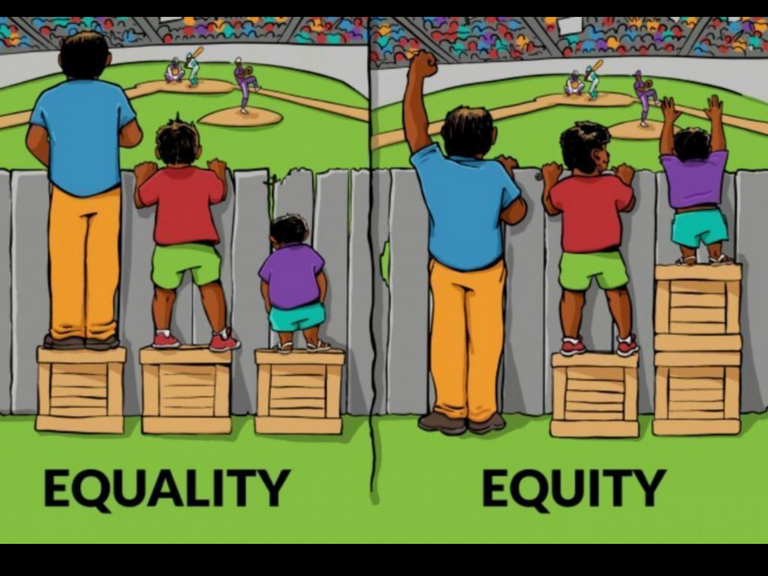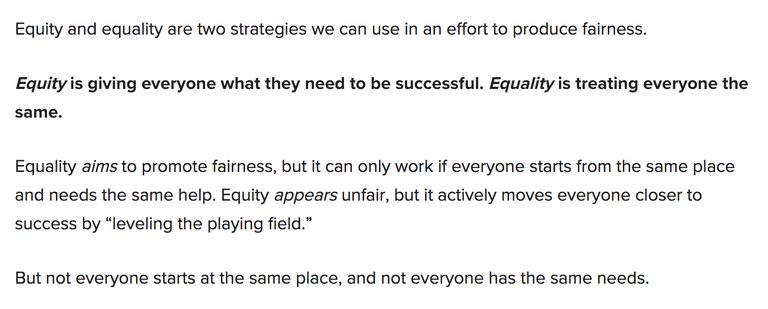I've been giving a good deal of thought to equity, how it differs from equality, and what it might look like as a guiding principle in my life. I'd like to share an example of a way in which equity has informed my thinking about a conflict between friends.
Recently a close friend, J., reached out to me, asking for support at a gathering we were planning on attending which would also include K., the partner of J's ex. J. was concerned that they wouldn't be able to keep their violent impulses in check, or feel grounded, loved and at home in their community with K. present. Their request was that I (along with others) check in with them, offer some love, and help them act in keeping with their highest self. I'm also friends with A., J's ex and K.'s current partner, and I consider K. a friend of mine as well; all three are part of a tight knit community. How best to show loyalty and support to my friends in this painful situation?
Situations like this call into question what loyalty means to me: does it mean making the enemies of my loved ones my enemies? Or does it mean giving protection and support to those I love in the ways they need it most, acknowledging and validating hurt, and aiming to hold all involved with compassion?
My philosophy regarding friends at war with one another has historically been (more or less) to continue offering friendship and support equally to all involved. Side taking as it commonly manifests in communities (based on blame, hate, and exclusion) serves to deepen wounds and create divisiveness, and I believe it is not truly in the service of supporting those who have been hurt or wronged. At the heart of this is the belief that those who have been hurt are, in their own way and in their own time, working toward healing and perhaps forgiveness.
This is not to say, however, that harm and/or hurt should be overlooked or ignored, or that we should go on as though nothing has happened. This would be akin to invalidating and distancing ourselves from the painful reality of our friends' experiences, and shirking our responsibility to hold those who have caused harm accountable, which would likely compound the harm. I believe it's possible to acknowledge and honor the pain and anger of those who are hurting without becoming vessels for vengeance or violence ourselves, and to hold wrongdoers accountable to repair harm without excluding or hating them. Holding all parties with compassion (and accountability, where appropriate) is a way of holding a container that supports this healing, and is not at odds with showing up in force for those we love.
As I come to better understand the concept of equity, however, I am seeing how it can inform the ways in which I show up in my friendships and relationships to others. Perhaps perfect equality is not what is called for in situations such as this -- and perhaps aiming for equality in the past was, in fact, a way for me to avoid standing in integrity with my principles or showing loyalty for those I love.
Says Amy Sun:
My friend J.'s hurt in this situation is immense, and my support in this moment means a great deal to them. Though we are not nearly as close, I know my other friend, K., well enough to know that they are doing well overall: emotionally, socially, romantically, and otherwise. It occurred to me that a more equitable response to this situation would be to give the bulk of my focus and friendship to my friend J., because (in my estimation) they need the support of their loved ones more than K. does right now. Both in private and public spaces, I can offer my friendship and support to J without worrying about coming across as bipartisan. I can also speak with K. honestly about my intentions and my reasons for this, why I feel it's necessary and important to show up for J. in this way, considering the closeness of our friendship and their need for support from their friends and community. I can speak to this while making it clear that I'm choosing to show up for J. out of love for them, rather than out of anger or hate for K. I can also take this opportunity to share with K. the ways in which I would like to see them take steps to repair the harm they've caused.
Putting my loyalties and choices into perspective in this way, I immediately felt at peace, and more in integrity with how I want to show up in these relationships. Though on the surface my actions may seem as if I have "taken sides", knowing that I am putting my energy and attention where it is most needed feels right and supportive to all involved. Gaining clarity in this way also enables me to be able to approach K. and let them know that if I put some space in our acquaintanceship for the time being, it's not out of malice or a desire to punish, but rather as a way to give my support and loyalty to J. during this difficult time.
I'm not prescribing this approach for every situation, but I think it's the right one for me in this one. Thinking about how equity can inform my loyalties adds nuance and depth to my responses to a complex situation and honors the differences in my relationships with those I care for, while allowing me to uphold my other principles of compassion, inclusivity, and non-violence.
If you have any stories of whether and how equity shows up in your life or relationships, please share! I would love to hear them.
Image source: Interaction Institute for Social Change | Artist: Angus Maguire.


It's so wonderful to watch your principles become clearer & more solidified in your own mind, and then unfold from there into the ways in which you move through the world.
Your logic is clear & consistent, and guided by your magnificent heart; so the results will surely be wonderfully healing & potent!